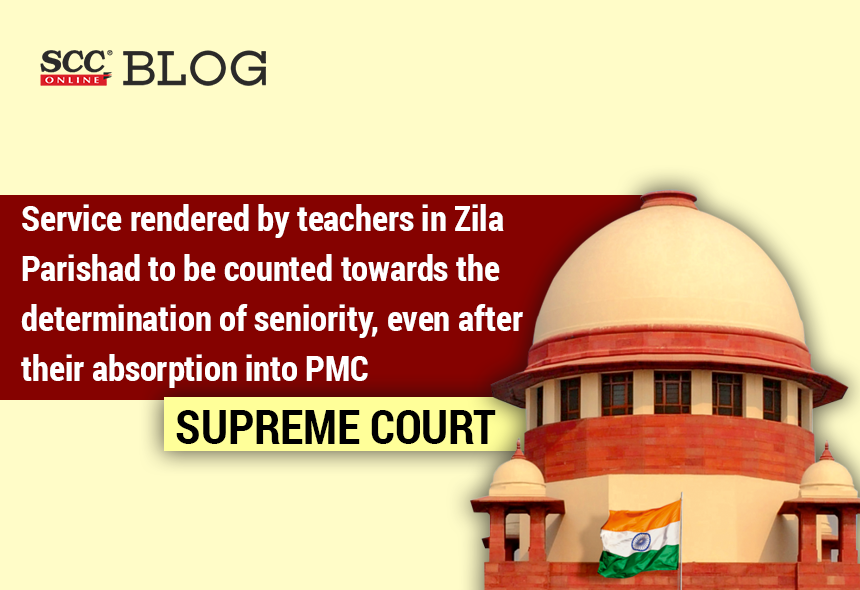Supreme Court: In an appeal regarding the issue that whether the services rendered by primary teachers while in the service of the Zilla Parishad deserves to be counted towards their seniority after the transfer and merger of their services into the Pune Municipal Corporation (‘PMC’), the division bench of Surya Kant* and J.K Maheshwari, JJ. held that the service rendered by respondents in the Zila Parishad is consistent and unbroken and it remains in existence even after their absorption into the PMC as a result of the statutory protection embodied under Clause (5) of Appendix (IV) read with Section 493 of the MMC Act.
In the case at hand, State of Maharashtra in exercise of its powers under Section 3(1) of the Maharashtra Municipal Corporation Act, 1949 (‘MMC Act’) decided to expand the territorial limits of the PMC and, consequently, the geographical area of 38 villages which were part of the Pune Zila Parishad were merged into the PMC with effect from 01-11-1999. Post the merger, primary teachers as well as employees from other departments who were serving in those villages were given the option to have themselves transferred and absorbed into the services of PMC. The respondents were working as Primary Teachers in the Pune Zila Parishad. They were appointed on different dates prior to 01-11-1999. They too were given an option for their merger in the PMC. They opted to accede to the absorption and joined the PMC.
The Court took note of Sections 3(1) & 3(3) of the MMC Act and said that Section 3(3)(b) merely states that whatever appointments, notifications, notices, rules or by-laws etc. are already in force in the existing ‘larger urban area’ will mutatis mutandis come into force in the “additional area” which is included by issuing a notification under Section 3(3)(a) of the MMC Act. The purpose of Clause (b) is to ensure that any statutory or administrative decision which has already been enforced by a Municipal Corporation in its existing larger urban area shall stay in force and will become applicable automatically in the newly added area also. The expression ‘appointments’ has to be understood in this context only.
Further, it said that Section (3)(3)(b) is not concerned with the protection of conditions of service of the employees of the Zila Parishad who are absorbed into a Municipal Corporation. When the Legislature never intended to regulate terms and conditions of the employees who are merged in a Municipal Corporation due to expansion of ‘larger urban area’, no inference in relation thereto can be drawn from the plain wording of Section 3(3)(b) of the MMC Act. Thus, it rejected the reliance placed by the Thus, the reliance placed by the appellants on the said provision was rejected.
The Court took note of Section 493 of the MMC Act and said that the provisions of Appendix (IV) shall apply to the constitution of the Corporation and other matters specified therein. Further, after analysing Clause 5 it said that deals with ‘continuation of appointments’, taxes, budget estimates, assessments etc.’ and its Subclause (C) specifically says that all officers and servants under the employment of a municipality or local authority immediately before the appointed day shall be officers and servants employed by the Corporation under this Act and shall, subject to other provisions made in accordance with the provisions of this Act, receive salaries and allowances and be subject to the conditions of service which were operative. The first proviso provides, crucially, that service rendered by such officers and servants before the appointment date shall be deemed to be service rendered in the service of the Corporation itself
Given the existence of this unambiguous provision, the Court held that the service rendered by respondents in the Zila Parishad has to be treated as service rendered in the PMC. Such service, therefore, has to be counted towards the determination of their seniority as well. Thus, there is no infirmity in the view taken by the High Court in this regard.
Further, it rejected the appellants objection on the ground that the respondents have acquiesced to the adverse decision taken against them and there is delay on their part.
[Maharashtra Rajya Padvidhar Prathamik Shikshak Va Kendra Pramukh Sabha v Pune Municipal Corporation, 2023 SCC OnLine SC 291, decided on 17-03-2023]







